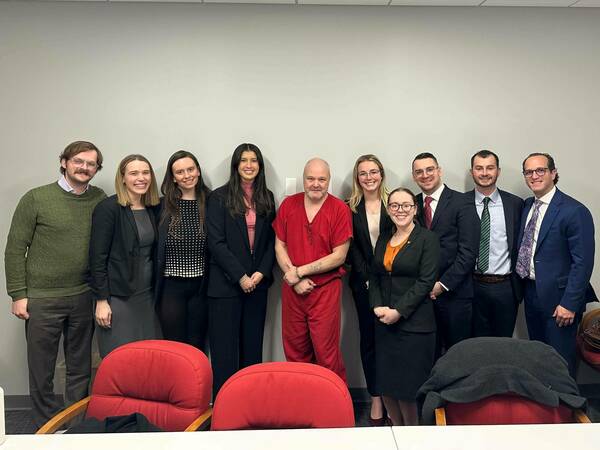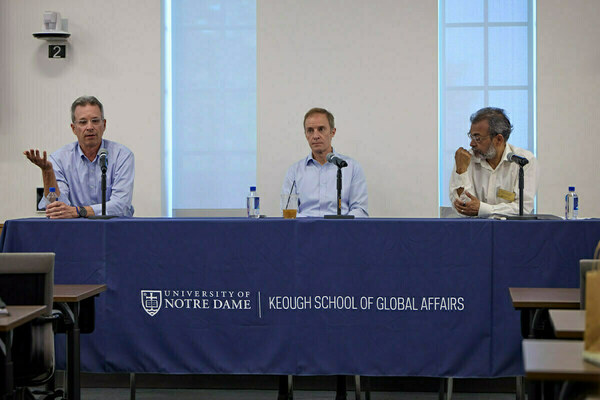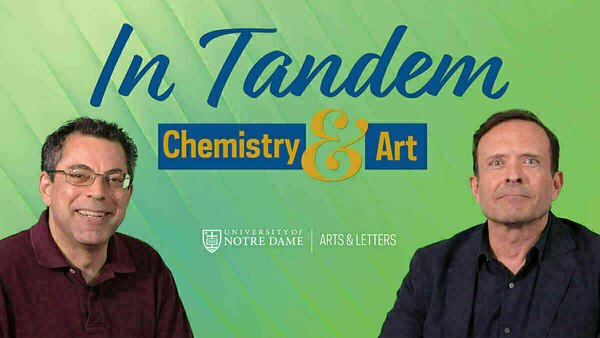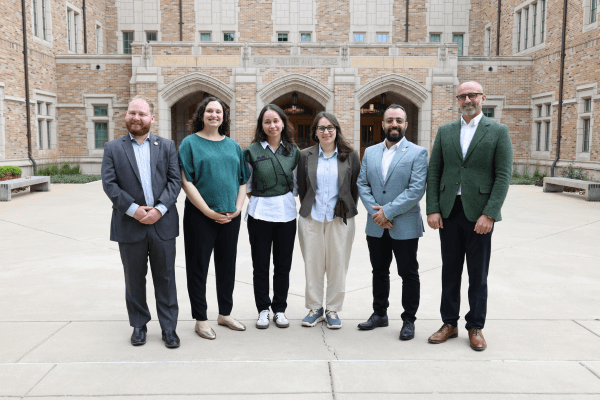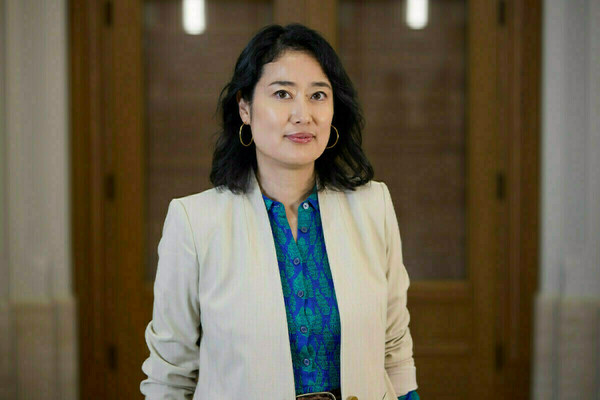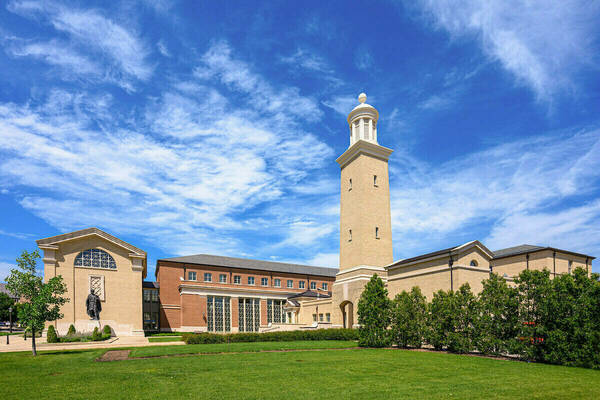Exoneration Justice Clinic Victory: Jason Hubbell’s 1999 Murder Conviction Is Vacated

This past Friday, September 12, Bartholomew County Circuit Court Judge Kelly S. Benjamin entered an order vacating Exoneration Justice Clinic (EJC) client Jason Hubbell’s 1999 convictions for murder and criminal confinement based on the State of Indiana’s withholding of material exculpatory evidence implicating another man in the murder.
In 1999, Hubbell was wrongfully convicted of the 1997 abduction and murder of Sharon Myers. He was sentenced to 75 years in prison and has served over 26 years. In October 2022, the EJC took on Hubbell’s case on a pro bono basis. This past February, EJC attorneys and students participated in a week-long evidentiary hearing at which the EJC presented new evidence implicating Michael Dean Overstreet in Myers’s murder. Michael Dean Overstreet is currently on Indiana’s death row in connection with the September 1997 abduction, rape, and murder of a Franklin, Indiana woman named Kelly Eckart.
As Judge Benjamin found, there were “stunning similarities” between Myers and Eckart’s murders. The two young women were abducted from nearby towns just months apart. Both were abducted from or after leaving their place of work. Both were believed to have been abducted in a van. Both had their shoes removed during their abductions. Both were killed in the Atterbury Wildlife Preserve in between Columbus and Franklin, Indiana. And both were strangled with ligatures that were made from their own clothing. As the judge explained, given these similarities, any information linking Overstreet to Myers or her abduction would have been “significantly favorable evidence” for Hubbell.
Judge Benjamin found that the State had improperly withheld from Hubbell and his attorneys an “overwhelming” amount of exculpatory evidence. Among other things, the State withheld evidence that Overstreet left his home early on the morning of Myers’s abduction and murder, stated that he was going to Myers’s place of employment, was gone all day, and returned home at the end of the day covered in blood. The State also withheld evidence from several unrelated sources that “provided a personal connection between Overstreet and Myers.” When questioned about his role in Myers’s murder at the evidentiary hearing, Overstreet invoked his Fifth Amendment privilege against self-incrimination.
Judge Benjamin further found that the Columbus Police Department’s lead detective on the case “intentionally failed to truthfully inform” Hubbell’s lawyers of this evidence during a pre-trial deposition. She found that this detective “had his sight on one suspect only and that was Hubbell,” and that this “tunnel vision” led the Columbus Police Department to “withhold[] material exculpatory evidence that either implicated Overstreet in Myers’s homicide and/or linked Overstreet to Myers.” The judge also found that this exculpatory evidence had been “intentionally delet[ed]” from the lead detective’s notes on the Myers homicide investigation.
The judge ordered that Hubbell be transported from Indiana prison to Bartholomew County Jail in advance of a status hearing set for October 2, 2025.
According to Professor Jimmy Gurulé, faculty director of the Exoneration Justice Clinic, this outcome was the product of a tremendous team effort by EJC staff and students. EJC staff attorney and term teaching professor Kevin Murphy '14 J.D. led the investigation and litigation of the case, with critical assistance from EJC legal assistant Anne Peterson '93, '02 J.D., EJC staff attorney Lenora Popken '20 J.D., adjunct professor of law Elliot Slosar, and EJC investigator Christian Sheckler. Indianapolis attorney Brent Westerfeld and investigators Denny Butler and Mark Mabrey also made invaluable contributions.
In addition, as Gurulé explained, Notre Dame students played an essential role in the case. “In the past three years, 14 current and former Notre Dame students worked tirelessly on Jason’s case, uncovering new evidence, interviewing witnesses, researching the law, drafting court pleadings and motions, and presenting new evidence in court. This ruling is a testament to their hard work and commitment to correcting the tragic miscarriage of justice and exonerating an innocent man,” Gurulé said.
“Without Jason’s legal team, the system would not have blinked. To fight for someone’s innocence and see the court do Jason justice and vacate his conviction, there is nothing better," said former EJC student Adam Miller '25 J.D. "I am endlessly proud of this EJC team.” Miller worked on the case as a law student in the EJC.
Second-year law student Ella Cain began working on Jason Hubbell’s case in 2023 as an undergraduate student intern at the EJC. Now enrolled in the EJC as a law student, she is once again part of the team working on the Hubbell case. "Working on Jason’s case has been the most profoundly impactful experience of my life. Getting to be a part of the team working toward Jason’s freedom has been not only rewarding but educational. I have gotten to be a part of discovery processes, early-stage drafting of briefs, and client communications," said Cain. She added, "If nothing else, my work at the EJC has taught me that lawyers wield tremendous power to either be a force for good or a force for injustice and that doing what is good will always be the right thing to do."
Originally published by at law.nd.edu on September 15, 2025.
Latest Research
- Energy experts: a sustainable U.S. future calls for a balanced approach…
- In Tandem: What an art historian and chemist learned by teaching a class togetherHow do you bridge the gap between two drastically different fields? For a Notre Dame art historian and chemist, all it took was sharing a classroom for…
- Kroc Institute welcomes six new Ph.D. students, names fellowship recipientsThe fall 2025 semester saw the arrival of six new doctoral students at the Kroc Institute for International Peace Studies, part of the Keough School of Global Affairs. Four of the incoming students make up the first cohort of the newly launched international peace studies doctoral program, with the…
- Researcher shows how immigration policy can strengthen opportunityAmy Hsin wants policymakers and the public to understand how immigration policy choices create barriers that limit opportunity. How do these structural forces hinder people from pursuing education, securing good jobs and planning for the future? And what might better alternatives look like?
- Notre Dame School of Architecture poised for global leadership through historic investmentThe $150 million gift represents an unprecedented commitment in the 160-year history of American architectural education. In recognition of this landmark gift, the school will be renamed the Matthew and Joyce Walsh School of Architecture at Notre Dame.
- Notre Dame faculty receive prestigious early career awards from the National Science FoundationDuring the 2024-2025 academic year, four researchers in the University of Notre Dame’s Colleges of Engineering and Science received early career awards from the National Science Foundation (NSF). The Faculty Early Career Development (CAREER) Program is one of the NSF’s most prestigious awards…



